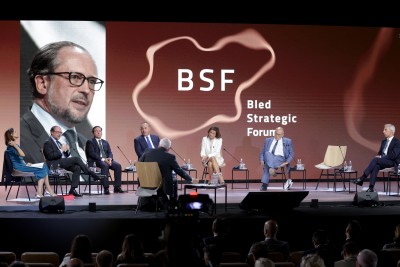Austria's Foreign Minister Schallenberg at the Bled Strategic Forum
Foreign Minister Alexander Schallenberg took part in the 17th Bled Strategic Forum in Slovenia, which this year was held under the motto "The rule of power or the power of rules? At the forum, the Foreign Minister spoke about the geopolitical consequences for Europe triggered by the Russian invasion of Ukraine and held several bilateral talks focusing on the Western Balkans.
 Austrian Foreign Minister Schallenberg spoke at a high-level panel discussion "How many Europes in Europe?". / Picture: © BKA / Wenzel / Flickr Attribution 2.0 Generic (CC BY 2.0)
Austrian Foreign Minister Schallenberg spoke at a high-level panel discussion "How many Europes in Europe?". / Picture: © BKA / Wenzel / Flickr Attribution 2.0 Generic (CC BY 2.0)
The Bled Strategic Forum is one of the leading international conferences in Central and Southeastern Europe, bringing together experts from different sectors and fields to discuss innovative approaches to strategic and political issues for the future.
The 17th Bled Strategic Forum in Slovenia is being held this year under the motto "The rule of power or the power of rules?". Here, the Foreign Minister spoke at a high-level panel discussion entitled "How many Europes in Europe?" about the geopolitical turning point triggered by the Russian invasion of Ukraine and its consequences for Europe.
The panel discussion "How many Europes in Europe" was strongly influenced by the Russian attack on Ukraine and its impact on Europe. Here, Foreign Minister Alexander Schallenberg emphasized Europe's resilience and that EU sanctions against Russia are already having an impact.
Thank you to @tfajon, @MevlutCavusoglu, @RauZbigniew, @thordiskolbrun, @LaurenceBoone, @jmalbares, @JoaoCravinho for joining me onstage for an excellent discussion!
— Alexander Schallenberg (@a_schallenberg) August 29, 2022
Foreign Minister Alexander Schallenberg told the Bled Strategic Forum that Russia is facing a recession of almost 10%, while the European economy is expected to grow by up to 3%. "Russia has double the inflation and whole sectors of the economy are being shut down. So we should not fall for the Russian narrative," according to Schallenberg.
Giving an outlook for the coming months, Foreign Minister Alexander Schallenberg called for Europe to continue to maintain its unity and "a cool head". Schallenberg called for continued European cohesion and Europe to "keep its cool in the coming months."
In addition, Foreign Minister Alexander Schallenberg used his stay in Slovenia for several bilateral talks, which focused on the Western Balkans.
During his bilateral working meetings at the Bled Strategic Forum, Foreign Minister Alexander Schallenberg focused on the Western Balkans. At a working lunch with the High Representative for Bosnia and Herzegovina, Christian Schmidt, the Austrian Foreign Minister addressed the political influence of third countries on the country, which further exacerbate existing divisions. As Vindobona.org reported, Bosnia and Herzegovina is facing general elections, which will take place in October. In the run-up to the election, political tensions are high in the country.
Habe heute Christian Schmidt, HR für Bosnien und Herzegowina, am @BledStratForum getroffen und ihm erneut unsere volle Unterstützung für @OHR_BiH zugesichert. Die Einheit von #BiH ist Voraussetzung für den Weg nach Europa. Gerade jetzt muss dieser Weg weiter gegangen werden! pic.twitter.com/NmHEYge71e
— Alexander Schallenberg (@a_schallenberg) August 29, 2022
Foreign Minister Alexander Schallenberg also met with the EU Special Representative for Dialogue between Belgrade and Pristina, Miroslav Lajčák, to discuss the normalization of relations between Serbia and Kosovo. As Vindobona.org reported, a partial solution was reached in the conflict between Serbia and Kosovo over mutual entry regulations.
Good to catch up with my friend, EU Special Representative @MiroslavLajcak, on the margins of @BledStratForum. Discussed recent progress on #Belgrade-#Pristina dialogue, agreed on importance of continuing on European path. pic.twitter.com/lJxBTcnSUH
— Alexander Schallenberg (@a_schallenberg) August 29, 2022
To the United Kingdom Prime Minister's Special Representative for the Western Balkans, Sir Stuart Peach, Foreign Minister Schallenberg stressed the importance of the United Kingdom's continued support for the European perspective of the Western Balkans. With Montenegrin Foreign Minister Ranko Krivokapić, the country's pioneering role in the EU enlargement process in the Western Balkans was discussed. Foreign Minister Schallenberg inquired about the progress of necessary reforms in Montenegro.
In addition to Foreign Minister Alexander Schallenberg, participants included Slovenian Foreign Minister and host, Tanja Fajon, Icelandic Foreign Minister Thórdís Kolbrún Reykfjörd Gylfadóttir, French Secretary of State for Europe, Laurence Boone, Spanish Foreign Minister, José Manuel Albares Bueno, Turkish Foreign Minister, Mevlüt Çavuşoğlu, Portuguese Foreign Minister, João Gomes Cravinho, and Polish Foreign Minister Zbigniew Rau participated in the panel.
Austria's Foreign Minister used the forum above all to make Austrian foreign policy more visible in the Balkans. For Austria, the Western Balkans are in the immediate vicinity and thus play an important role in Austria's foreign policy.
BMEIA Federal Ministry for Europe Integration and Foreign Affairs



